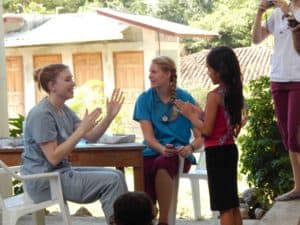 January 15, 2015
January 15, 2015
The 1969 war between Salvador and Honduras, sometimes referred to as the Soccer Wars or the Hundred Hours War, left many parts of Honduras bordering El Salvador isolated, with shortages of basic services and infrastructure. These effects last into the present day where, in the southern section of the department of Intibucá, services and infrastructure remain scarce and tenuous. In 1990, the small municipality of Santa Lucia suffered disproportionately the price of a war two decades past. Here there was no physician, no non-profits or relief agencies, no electricity, and the only water came from the community tap in the center of town.
Meanwhile at the University of Cincinnati, Dr. Jeff Heck, part of the junior faculty, was organizing a medical brigade to Honduras to be sponsored by Ruth and Daniel Castro from the Christian Medical and Dental Society of Honduras. Could any of the participants on that brigade really have known what they were getting into? Had they known, would they have gone? And what amazing things would spring forth from the innocence of their good will!! A team of twenty, including five physicians, slept on the floor at the school and municipal building. They worked from sunup to sundown and saw 4000 patients, assisted by the public health nurse, the only medical professional working in the area. The community asked them to return.

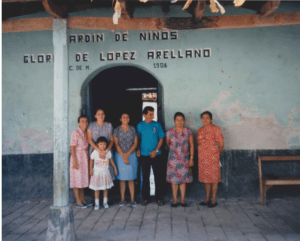
At this point, anything could have happened. The University of Cincinnati might have thought the project a folly and ended their support and funding. The project could have continued by way of sending brigades year after year to simply respond to physical needs. But what did happen was so much greater and so amazing. Relationships were forged, formed, and evolved, creating a synergy that profoundly transformed the lives of everyone committed to those relationships. In 1993, with money left over from a $1 million grant to study diarrhea among travelers to the tropics, construction on the first clinic began. A team of professional builders volunteered much of their time and talent, many of the building supplies were donated, and Chiquita Brands assumed the expense of shipping materials. Good will, service, caring, and the integrity of human relationship united to become a permanent site for healing and development.
After four or five years, Daniel and Ruth Castro suggested the name Shoulder to Shoulder, becoming interchangeable with Hombro a Hombro. Few organizations title themselves according to their philosophy. In extensive conversations among faculty at the university, among students and brigade participants, among community members in Cincinnati and Honduras, it was clear that this project would not survive or thrive save for the intricate participation of those served, the Hondurans themselves. The living of that philosophy was as much practical as it was ideal, given that so few from Cincinnati spoke Spanish and were only in Honduras once or twice a year. Whatever the motive, the philosophy secured the dignity of the persons served. Shoulder to Shoulder, Hombro a Hombro, became sustainable as Hondurans themselves took ownership of the service, care, and empowerment that has always identified its vision and mission.

Twenty-five years ago, a few professors, doctors, and medical students from the University of Cincinnati offered a hand of assistance to a desperately poor and oppressed people. They did so with respect, recognizing that Hondurans themselves would own and manage their health care and development. Shoulder to Shoulder was once small and from Cincinnati. Twenty-five years later, Shoulder to Shoulder/Hombro a Hombro, is big and from Honduras, Cincinnati, and the world. Shoulder to Shoulder once responded exclusively to the physical needs it encountered. Twenty-five years later, Shoulder to Shoulder/Hombro a Hombro, responds to the inherent dignity of all life and seeks to empower and develop relationships of liberation and justice.
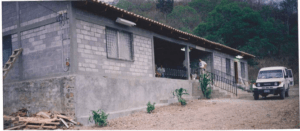
In tribute to Shoulder to Shoulder and in anticipation of the reunion brigade scheduled for May of this year, Dr. Jeff Heck reflects,
“Some of the best people I know have been involved with Shoulder to Shoulder from all walks of life, all with different perspectives, faiths and otivations. The majority have been motivated by a genuine concern for people left behind and have been willing to make great sacrifices on their behalf. Shoulder to Shoulder has done much to help physicians, nurses, dentists, and other health professionals restore their idealism that motivated them to join their professions in the first place. I count myself fortunate to have watched radical transformations in many people. Thus it is difficult to say who benefited the most: the Hondurans or the North Americans who came to ‘help’.”
All of this because twenty-five years ago, twenty people came to Honduras to offer some limited, medical service. Imagine!!
Scaling Mountains in San Marcos

December 3, 2014
My wife Laura and I spent yesterday mountain climbing. It wasn’t intentional. We were visiting San Marcos de la Sierra. From where the bus dropped us off we walked straight down, probably 1500 feet to the town center. A little later in the day we visited a second community of San Marcos called Aguacate, on the other side of the highway. We walked back up to the highway, then descended the other side, probably about 2000 feet. Returning to the highway at the end of the day to leave, we took the shortcut up, a harrowing path that most mountain goats would think twice about traversing.
The people who live in San Marcos face these difficult uphill climbs daily, both literally and figuratively. There is little to no income or jobs in San Marcos. Most families are subsistence farmers living hand to mouth. They are isolated in this most remote, rural, and rugged territory. Poverty means malnourishment, poor health, shorter life expectancy, more risk of child mortality, less education and little opportunity for success, and all of this while scaling mountains.
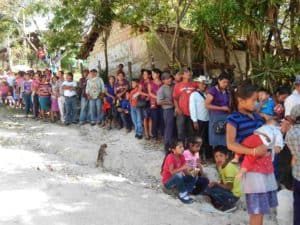
These people are easily lost and forgotten, even by the rest of Honduras. That is why what is happening with the Universidad Nacional Autónoma de Honduras (National Autonomous University of Honduras, UNAH) is something very special. When Laura and I arrived at the center of town, we saw an unusual sight. The presence of even a car or truck would have elicited special note, but here were three large buses from UNAH parked alongside the church. They had brought in the seventy plus students and faculty. Generally we think of brigades, medical or otherwise, as coming from the outside, foreigners with abundant foreign resources. But here were Honduran students and faculty responding in a generous and intense way to the needs of this small municipality and its people. The commitment of UNAH to the people of San Marcos clearly articulates a powerful message: You are not lost nor forgotten by the rest of Honduras.
There would only be one full day of the brigade, so it was no surprise to see the long lines outside the public school building where the doctors and nurses were. We’ve become somewhat acquainted with the medical brigade motif. But things here were different. The most obvious difference was that there were no translators. This allows for a deep sense of trust and respect, something that for all the best intentions of foreign brigades cannot be reproduced. We had already met the engineering students in the main plaza area of the town, discussing the town’s unique water problems and how they might be addressed. At the clinic area itself, in each of the examining areas, a law student or a lawyer was present for legal consults. Here were doctors, nurses, orthodontists, lawyers, engineers, teachers, biologists, and so many more. It seemed every profession discipline that could possibly assist this small town community was present. We even met a social worker. Laura and I are both social workers, and we had long since given up on meeting a Honduran one. It bought us great joy.
So why were all these professions present at a one day medical brigade? It seems the university’s commitment is way beyond the one day brigade. As the mayor of the town, whom we met with later in the day in Aguacate, told us, this is a “convenio” (covenant agreement) that will last for decades. This is not about giving a person a lift up the hill one time, leaving them off at the side of the road to wait for the bus, then scooting off to Tegucigalpa in your Land Cruiser. No, this is about commitment and building relationship. This is a partnership. The brigade was for a day, but the relationship is ongoing. They’ll come back next year for another day’s brigade. But over the course of the year, there will be a great deal of communication and ongoing work; the mayor with the university, the university with Shoulder to Shoulder, the health center of the town with the university, the various local associations with the university, and so on. Francisco Portillo, the social worker, explained it to us as an ongoing needs assessment and a continual search for creative resources; going up and down the hill.
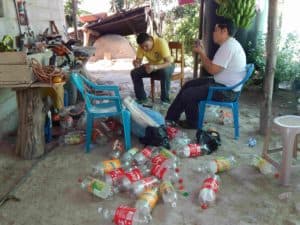
We had a great day climbing mountains. We thank Manuel, one of Shoulder to Shoulder’s health promoters, and Carlos, Shoulder to Shoulder’s health data collector, for guiding us around all day; Paola Barrientos, nursing department at UNAH, who has a ton of energy and is thoroughly dedicated to this project; Doctor Maricela Figueroa, one of the brigade leaders, who graciously shared the inclusive mission of their work; the mayor of San Marcos; and so many others.
…. and if there are tall mountains to climb, we’ll climb them together.
Rude Roosters and Patty Cake
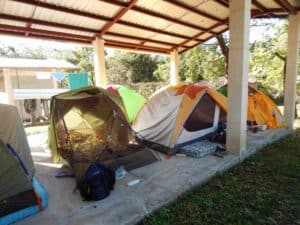
November 22, 2014
She hasn’t had a good night sleep since coming to Honduras. It isn’t sleeping in a tent on a concrete floor under the stars. The tent, after all, is placed over a semi soft mattress. It’s not the time change, only an hour’s difference. The tropical warmth doesn’t seem to bother her, even though she does live in Wyoming and it is mid-November. Those squirmy and crawly things are close by, but she’s not the type to jump up on a chair at the threat of a mouse. What is it then that keeps her awake half the night? She had once been told, and always believed it to be true, that roosters only crow to greet the sunrise. Actually, and this is not scientifically proven, roosters crow because they abhor silence, beginning their wrenching screams sometime around midnight and only slowing down sometime after dawn. Unfortunately, here in the frontier region of Intibucá, in the small village of Agua Salada, this tone-deaf choir outnumbers the human population by at least three to one.
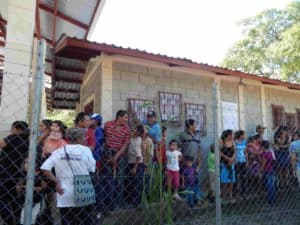
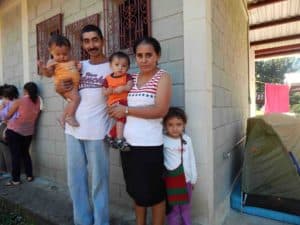
On Tuesday she is dragging a little bit. Perhaps that’s why the brigade leaders have given her light duty, fitting and distributing reading glasses. Still, when it’s real slow, she might be asked to assist with an injection or minor surgery. On occasion the pharmacy gets busy and she’s called over to fill prescriptions. On Monday, one of the leaders guessed that they saw about 120 patients. Perhaps everyone had shown up on the first day, but on Tuesday there are actually more. The word must be traveling to the more outlying districts. Whether tomorrow will bring more, or whether it might start to wane, no one is sure. But hundreds come, lined up for hours, to see one of the four doctors available; to get a diagnosis, a prognosis, a word of assurance and comfort sometimes in broken Spanish and sometimes via translators, a medication, a treatment, and some relief.
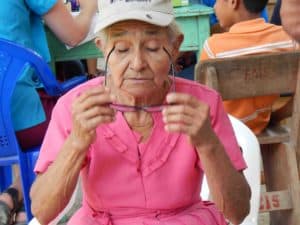
If that is all the Wyoming Brigade does, it’s certainly a great deal. But the generosity extends beyond the clinic and into the homes and lives of the residents of Agua Salada. They came with hygiene supplies. They came with school supplies. They now provide school scholarships for five local children and look to provide more. This is not simply about a generous gift, but rather it is about the commitment of relationship. The University of Wyoming partners with the community of Agua Salada and Shoulder to Shoulder such that enrichment, development, transformation, and meaningful growth are deeply rooted into the hearts of all involved: brigade members, beneficiaries, community leaders, and all who are committed to the relationship.
Later in the day when the lines are receding, the young nursing student who hasn’t gotten much sleep due to the rude roosters, might have slipped away to grab an hour or two siesta. She doesn’t speak Spanish, but all day long she’s been using the international language of play with children. I spy her now with two girls, maybe seven and eight years old. They are fully engrossed in a game of “patty cake” — mimicking, mirroring, and hand slapping. The smiles on their three faces, the sign of commitment and love, are the most powerful medicine that the University of Wyoming has distributed all day.
